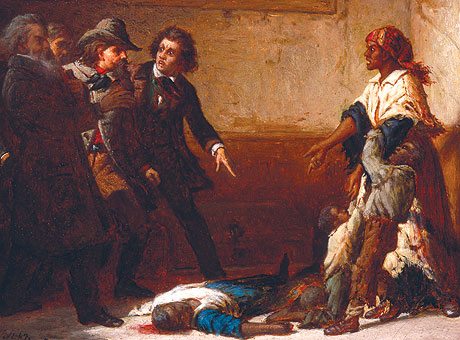In Toni Morrison’s novel, Beloved, many complex issues are explored. Issues such as race, gender, sin, forgiveness, and morality. From these issues, many interpretations of the theme or “hidden meaning” of Beloved can be drawn. When read through a psychoanalytic lens, one main theme stands out as impactful, and is also presented in the article, “The Bonds of Love and the Boundaries of Self in Toni Morrison's Beloved”, by Barbara Schapiro. Through the novel, especially the characters Sethe and Denver, Morrison communicates the message that possessing a sense of self is liberating and empowering, and without it a person can feel sad, lost, and trapped.
In Beloved, through the character of Sethe, Morrison reveals the message that possessing a sense of self gives a person freedom and power, but without it a person can feel sad, lost, and trapped. Schapiro talks about the theme of owning one’s self and the importance of that action in her analysis article of Beloved. She writes that, “The major characters in the novel are all working out of a deep loss to the self, a profound narcissistic wound that results from a breakdown and distortion of the earliest relations between self and other” (Schapiro 197). Many of the characters in Beloved are African Americans who struggle with their painful pasts filled with regret, and as stated by Schapiro, are “working out of a deep loss to the self”. The psychoanalytic lens shows how this “self” is often pushed away into the Id (subconscious) mind, along with the hidden desires and and fears. The horrors of slavery are still fresh in the minds of the characters in Beloved, the last generation of U.S. slaves, and Morrison describes the many atrocities committed against Sethe, her friend Paul D., Baby Suggs, and Sethe’s mother. Through these scenes, she conveys a theme that one is not truly free until they know who they are and claims their freedom for themselves.
Gaining a sense of self is liberating and empowering, and this is shown in Beloved when at last Denver finds hers. Finally escaping from under the shadow of Beloved, Denver searches for a job to support her mother, Sethe, who is wasting away. She gets one from the kindly Mrs. Jones, who addresses Denver and sees her as a woman. Denver begins to feel empowered because of this recognition, and “for the first time begins to experience the contours of her own separate self” (Schapiro 206). Finally on her way to being secure in who she is as strong a woman of color, Denver helps her mother and stands up to Beloved. The subconscious and hidden fears and desires break free and Denver is able to live into who she truly is. Having a sense of self empowers and frees Denver, and others also notice the changes in her.
On the other hand, a person without a sense of self feels sad, lost, and even trapped by their own selves. After becoming free from the slavery she was born into, Baby Suggs still struggles with what she has been through. During the years that the ghost of Beloved haunts house number 124, Sethe exclaims that she wants to move. Baby Suggs replies by saying, “Not a house in the country ain't packed to its rafters with some dead Negro's grief” (Morrison 6), her husband being one of them. Till her dying breath, Baby Suggs continues to struggle with her grief and pain. Schapiro makes an interesting point by writing, “Thus Baby Suggs, finally freed from slavery, expresses not the elation of freedom but the deep sadness of not knowing herself, of not being able to read her own story: ‘The sadness was at her center, the desolated center where the self that was no self made its home…’ ” (209. This supports the theme of the importance of finding and owning one’s self in the book Beloved because of how Baby Suggs’ “deep sadness” is caused by the fact that she is subconsciously still a slave trapped by fear who does not know who she is at her center. Similarly, Sethe struggles with knowing herself, placing her identity in her daughter Beloved and her role as a mother instead of looking into herself to find her hidden desires and goals. Without a sense of self, both characters are trapped, depressed, and have lost sight of who they are.
Through the novel, especially by the character of Sethe, Morrison communicates the message that possessing a sense of self is liberating and empowering, and without it a person can feel sad, lost, and trapped. Reading Beloved through a psychoanalytic lens, a reader notices the important differences between what a character does and says consciously and what they actually think and feel subconsciously. The subconscious and conscious mind determines what people do, think, and want. As Toni Morrison says in Beloved, “Freeing yourself was one thing; claiming ownership of that freed self was another” (111-112).

